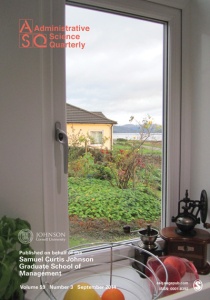The Hidden Costs of Working Sick
 Work doesn’t stop when we’re under the weather. But how does feeling bad affect how we perform our jobs? To address this question, Michael Christian, Noah Eisenkraft, and Chaitali Kapadia of the Kenan-Flager Business School at the University of North Carolina Chapel Hill investigate how somatic complaints such as pain and illness affect how much people help their coworkers and expend less effort on their job. Tracking two samples of office workers over time, the researchers linked pain at work to ebbs and flows job performance via its effects on the worker’s energy.
Work doesn’t stop when we’re under the weather. But how does feeling bad affect how we perform our jobs? To address this question, Michael Christian, Noah Eisenkraft, and Chaitali Kapadia of the Kenan-Flager Business School at the University of North Carolina Chapel Hill investigate how somatic complaints such as pain and illness affect how much people help their coworkers and expend less effort on their job. Tracking two samples of office workers over time, the researchers linked pain at work to ebbs and flows job performance via its effects on the worker’s energy.
Explaining their findings, the researchers argue that pain and illness consumes the same energy people use for motivation and direct towards performing work tasks. As a result, workers in pain are more  likely to withdraw and narrow their focus to just the essential parts of their job role. People in pain, whether the pain is caused by a chronic condition or a fleeting headache, are less likely to help coworkers or make constructive suggestions for improvement at work. On the bright side, the study reported that these effects diminished over time. Long-term sufferers of chronic pain have an increased capacity for balancing daily job demands with pain.
likely to withdraw and narrow their focus to just the essential parts of their job role. People in pain, whether the pain is caused by a chronic condition or a fleeting headache, are less likely to help coworkers or make constructive suggestions for improvement at work. On the bright side, the study reported that these effects diminished over time. Long-term sufferers of chronic pain have an increased capacity for balancing daily job demands with pain.
The implications? Daily changes in physical health should be “legitimized” at work. Employees are often asked or obligated to work regardless of how poorly they feel. This is bad for business. Organizations that want the best performance from their employees should be proactive about employee health, developing and implementing effective treatments and symptom management strategies, especially for those employees who have chronic health conditions. Leaders who recognize that an employee’s physical health—rather than his or her commitment—can affect performance may reap long-term benefits by showing understanding to their workers. The study is published in Administrative Science Quarterly.
[The study is entitled “Dynamic Associations among Somatic Complaints, Human Energy, and Discretionary Behaviors: Experiences with Pain Fluctuations at Work” and can be read for free from Administrative Science Quarterly by clicking here.]






























































































